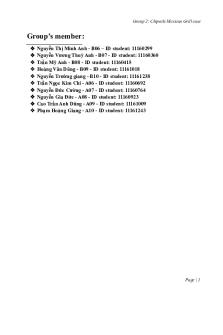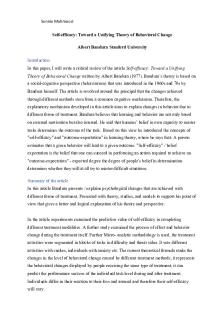ASM401 Individual Assignment PDF

| Title | ASM401 Individual Assignment |
|---|---|
| Author | Aqwa Ikwan |
| Course | Fundamental of business |
| Institution | Universiti Teknologi MARA |
| Pages | 8 |
| File Size | 223.8 KB |
| File Type | |
| Total Downloads | 155 |
| Total Views | 849 |
Summary
2 ACKNOWLEDGEMENTI would like to express my deepest appreciation to all those who provided me the possibility to complete this report. A special gratitude I give to our final project lecture, Prof. Dr. Voon Boo Ho, as my lecturer and mentor as he already taught me more than I could ever give him cre...
Description
2.0
ACKNOWLEDGEMENT
I would like to express my deepest appreciation to all those who provided me the possibility to complete this report. A special gratitude I give to our final project lecture, Prof. Dr. Voon Boo Ho, as my lecturer and mentor as he already taught me more than I could ever give him credit for here and also helped me to coordinate my project especially in writing this report. Furthermore, I would also like to acknowledge with much appreciation the crucial role of manager Mrs. Lim, who giving me the permission to letting me do some interview and necessary materials to complete our task with the title that already been choose that is Ethics in Workplace. A special thanks also goes to my teammates, Muhamad Hazwani, Mohamad Raffique, Rowny Allen and Bantin who help me to assemble the parts and gave suggestion about the task Ethics in Workplace. Lastly, I would like to thanks go to the Most importantly, nobody has been more important to me in the pursuit of this project than the members of my family. I would like to thank my parents, whose love and guidance are with me whenever I pursue. They are the role models.
3.0 INTRODUCTION What is ethical behaviour? Ethics are beliefs about what’s right and wrong or good and bad. An individual’s values and morals, plus the social context in which his or her behaviour occurs, determine whether behaviour is regarded as ethical or unethical. In other words, ethical behaviour is behaviour that conforms to individual beliefs and social norms about what’s right and good. Unethical behaviour is behaviour that conforms to individual beliefs and social norms about what is defined as wrong and bad. Business ethics is a term often used to refer to ethical or unethical behaviours by employees and manager in the context of their jobs. Ethics or ethical standard behavior is one of the most important work attributes to be implement in business bodies or corporate bodies because it will benefit the companies’ culture and the bottom line. This is priority for the employees because employees with a best ethics will ensure in giving the best and strong image also acceptable to society. Not just for the worker but also for the manager of the companies so that they can be an example for their employees to keep the image of their company toward the society. There is various type of ethics that can be embed. For example, the ethics type was individual ethics, business and managerial ethics, and company practices and business ethics. This ethics help some employees to improve and getting advances in work and doing business.
4.0 CONTENTS
4.1
Ethics in workplace
Ethics can be classes in many types to implemented in all companies for their workers to made them more efficient and productive in doing their works. This was important for the companies because the ethics from the workers shows the best from the companies’ production and efficiency. Figure 1 shows the type of ethics that can help the company in improving their workers ethics.
Individual Ethics
Ethics Company practice and Business Ethics
Business and managerial Ethics Figure 1: Type of Ethics
4.2
INDIVIDUAL ETHICS
Individual ethics is a category that determines as what an individual believes about morality that is about what right and wrong. Ethics are also based on both individual beliefs to compare and social concepts that is they vary from person to person, from situation to situation, and from culture to culture. Social standards are comprehensive enough to support differences in beliefs of an individual. Without violating general standards, people may develop personal codes of ethics reflecting a wide range of attitudes and beliefs. Thus, ethical and unethical behaviours are determined partly by the individual and partly by the culture. For instance, virtually everyone would agree that if you see someone drop their money such as RM 50, the ethical things to do would be to return it to the owner or there’ll be less agreement if you find RM 50 and don’t know who dropped it. 4.3
THE LAW AND THE REAL WORLD
Societies generally approve formal laws that reflect principal of ethical standards or social norms. The law also helps in preventing from punishing the unethical standards. For example, because most people regard stealing as unethical, we have laws against stealing and ways of punishing those who stealing. Real-world situations can offer be interpreted in different ways, and it isn’t always easy apply statutory standards to real-world behaviour. This law needs to apply in every companies so that the organization can prevent from judging the unethical standards of the workers and also keeping the standards of work in their workplace. 4.4
INDIVIDUAL VALUE AND MORALS
Business situations that are ambiguous in terms of both ethics and the law can be deal by start with the values and morals of people in a business, its managers, employees and other legal representatives. Each person’s individual values and morals, in turn, are determined by a condition of factors. We started to form values and morals as children in response to our
perceptions of the behaviour of parents and other adults. Soon, we enter school, where we’re influenced by peers, and as we grow into adulthood, experience shapes our lives and contributes to our ethical beliefs and our behaviour. If someone put financial gain at the top oy their priority list, they may develop a code of ethics that supports the pursuit of material comfort. If they set their family and friend as a priority, they’ll no doubt adopt different standards. 4.5
BUSINESS AND MANAGERIAL ETHICS
Managerial ethics refers to the standards of behavior or moral guidance for individual especially for supervisor or managers towards their employees in their workplace. They must know how to manage their ethics of managing so that they can keep the images of the company. Although some of workers ethics can affect their work in any number of ways, it’s helpful to classify them in terms of three broad categories.
Behavior towards employees
Managerial Ethics
Behavior towards other economy agents
Behavior towards the organization
4.5.1 Behavior toward employees This category of managerial ethics relates to such matters as hiring and firing, wages and working conditions, privacy and respect towards the employees. Ethical guidelines suggest and legal standards require that hiring and firing decisions should be based solely on a person’s ability to perform a job. Although such decisions may not illegal, they may be questionable on ethical grounds. Wages and working conditions, although regulated by law, its also areas for potential controversy. A manager may pay a worker less than he deserve. For example, because the manager of Sam Fah Enterprise knows the employee can’t afford to quit or risk his job by complaining. While its hard to judge whether some case are clearly ethical or unethical, others are fairly clear-cut. Consider the behavior of Lim management toward the company employees. Lim management encouraged employees to invest retirement funds in company
stock and then, when financial problems began to surface, refused to permit them to sell the stock even though top officials could sell. 4.5.2 Behavior Toward the Organization Ethical issues can also arise from employee behaviour toward employers, especially in such areas as conflict of interest, confidentiality and honesty. A conflict of interest occurs when an activity may benefit the individual to the disadvantage of his or her employer. Most companies have their own policies that is preventing buyers from accepting a gift in many forms from suppliers. For an instance example, because of such gifts might be construed as a bride or an attempt to induce favouritism. Businesses in highly competitive industries software and fashion apparel, for example also have safeguards against designers selling company secrets to competitors. Relatively common problems in the general area of honesty include stealing supplies, padding expense accounts, calling in sick just to stay home and relax, and also using a business phone to make personal, long-distance calls. Most employees are honest, but many organizations remain vigilant. 4.5.3 Behavior Toward Other Economic Agents Ethics also comes into play a role in the relationship of a business and its employees with purported as primary agents of interest, mainly for customers, competitors, stockholders, suppliers, dealers, and unions. For example, some investment company scams cost hundreds of his clients their life savings. They led others to believe that their money was safe and that they were earnings large returns when in fact their money was being hidden and used support the company own extravagant lifestyle. They then use the funds from new clients to pay returns to older clients that being called a Ponzi Scheme. This action showed an obvious disregard for their investors. 4.6
ASSESSING ETHICAL BEHAVIOR
What distinguishes ethical from unethical behaviour is often subjective and subject to differences of opinion. There some step that can set a simplified course for applying ethical judgements to situations that may arise while business activities such as gather the relevant factual information, analysing the facts to fix the most appropriate moral values and make an ethical judgment based on the rightness or wrongness of the proposed activity or policy. Unfortunately, the process doesn’t always work as smoothly as these three steps suggest. To fully assess the ethics of specific behaviour, we need a more complex perspective. Consider as a common problem faced by the managers with expense accounts. For example, Sam Fah routinely provide managers with accounts to cover work-related expenses, rents bill, meals, and rental cars or taxi when they are traveling on company business or entertaining clients for business purpose. They expect employees to claim only work-related expenses. 4.7
COMPANY PRACTICES AND BUSINESS ETHICS
As unethical or even illegal activities that have been done by both managers and employees giving more impact to the company, many firms already taken additional steps to encourage ethical behaviour in the workplaces. Many set up codes of conduct and develop clear ethical position on how the firm and its employees will conduct business. An increasingly controversial area regarding business ethics and company practices involves the privacy email and other communication that take place inside an organization. There are some of the most common methods to formalizing top management commitment to ethical business practices that is adopting written codes and instituting ethics programs especially for the employees.
4.7.1
Adopting Written codes
Many other businesses have written codes that formally announce their commitment to do business in an ethical manner. Ethical codes has already being implement by every organization and business bodies to assist their members in understanding the difference between the right and wrong and also in applying that so they can understanding their decisions. The number of such companies has risen dramatically in the last three decades, and today almost all major corporations have written codes of ethics. The role that corporate ethics and values should play in corporate policy is illustrates in Figure 1. The figure suggests that although strategies and practices can change frequently and objectives can change occasionally that made an organization’s core principles and values should remain steadfast.
Figure 2: Core Principles and Organizational Values
4.7.2
Instituting Ethics Programs
Many examples suggest that managers can learn ethical responses through experience. Most analysts agree that even though business schools must address the issues of ethics in the workplace, companies must take the chief responsibility for educating employees. In facts, more and more firms are doing so. For example, Sam Fah sometimes having major ethics program. All worker must go through periodic ethics training to remind them of the importance of ethical decision making and to update them on the most current laws and regulations that might be particularly relevant to their company. 5.0 CONCLUSION The business entities and corporate bodies that understand and are able to carry out ethics in the workplace, will surely be able to embrace the positive image among the society. This positive image will help the companies or corporate bodies gain a fortune resulting from multiplying business profits. With the profit that being earn, certain corporate bodies are able to allocate a fraction of them to be channelled you carry out the ethics in workplace. Without
the support of the communities, the appropriate business environment and government policies supporting business advancement, surely the speed of the business growth cannot be enjoyed. Hence, by implementing the ethics in any other business bodies will be able to help and supported the growth of the business. The companies that carry out the ethics in workplace will effectively do not only benefits the company itself but also benefits various parties that involved. Ethics is very important to be applied by so that business bodies can ensure in giving the best and strong image also acceptable to society.
References Essays. (2018). Ethic In Work Place Business Essay. London, UK: Essays . Griffin, R. J. (2017). Business Essentials. London, UK: PEARSON. Heinig, I. (2018). How Can Companies Encourage Ethics in the Workplace? The Manifest. Olaf, S. (n.d.). What is Ethics? A Guides to Ethics. Patrick, J. A., & Quinn, J. F. (1997). Management Ethics Integrity at Work. SAGE Publication. Stark, A. (1993). What’s the Matter with Business Ethics? MANAGING PEOPLE....
Similar Free PDFs

ASM401 Individual Assignment
- 8 Pages

Assignment ASM401 - Essay
- 6 Pages

Individual Assignment
- 26 Pages

Individual Assignment
- 20 Pages

Individual assignment
- 5 Pages

Individual assignment
- 3 Pages

MGT 162 INDIVIDUAL ASSIGNMENT
- 24 Pages

finance - individual assignment
- 7 Pages

Mkt individual assignment
- 4 Pages

BUS assignment individual
- 7 Pages

Report - Assignment 2 : Individual
- 11 Pages

Individual Assignment 1
- 1 Pages
Popular Institutions
- Tinajero National High School - Annex
- Politeknik Caltex Riau
- Yokohama City University
- SGT University
- University of Al-Qadisiyah
- Divine Word College of Vigan
- Techniek College Rotterdam
- Universidade de Santiago
- Universiti Teknologi MARA Cawangan Johor Kampus Pasir Gudang
- Poltekkes Kemenkes Yogyakarta
- Baguio City National High School
- Colegio san marcos
- preparatoria uno
- Centro de Bachillerato Tecnológico Industrial y de Servicios No. 107
- Dalian Maritime University
- Quang Trung Secondary School
- Colegio Tecnológico en Informática
- Corporación Regional de Educación Superior
- Grupo CEDVA
- Dar Al Uloom University
- Centro de Estudios Preuniversitarios de la Universidad Nacional de Ingeniería
- 上智大学
- Aakash International School, Nuna Majara
- San Felipe Neri Catholic School
- Kang Chiao International School - New Taipei City
- Misamis Occidental National High School
- Institución Educativa Escuela Normal Juan Ladrilleros
- Kolehiyo ng Pantukan
- Batanes State College
- Instituto Continental
- Sekolah Menengah Kejuruan Kesehatan Kaltara (Tarakan)
- Colegio de La Inmaculada Concepcion - Cebu



